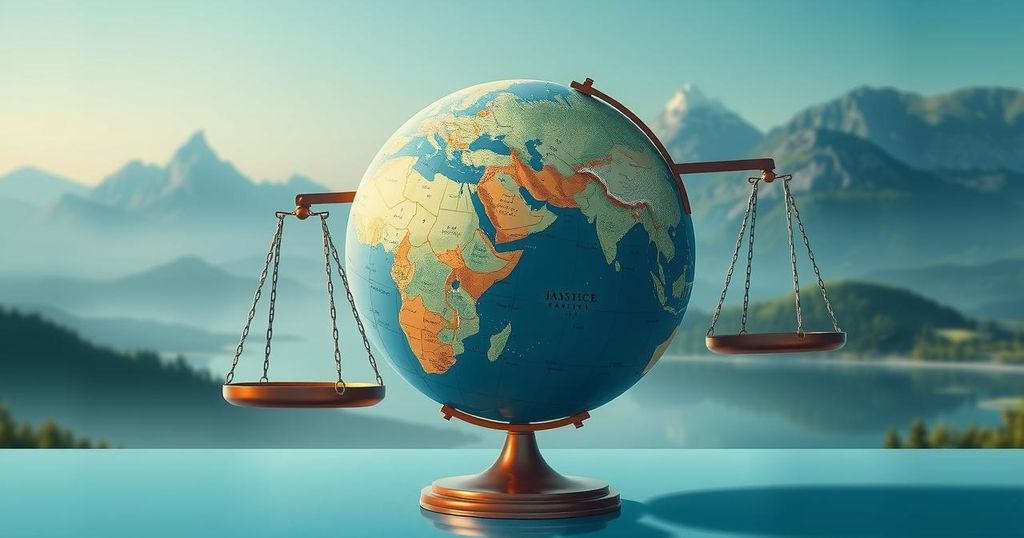Politics
BOLIVARIAN REPUBLIC OF VENEZUELA, BRITAIN, CORRUPTION, CUBA, DEMOCRACY, ELECTORAL COUNCIL, HUMAN RIGHTS, ICJ, INTERNATIONAL COURT OF JUSTICE, JUDICIAL SYSTEM, NICOLAS MADURO, NICOLÁS MADURO, NORTH AMERICA, ORINOCO RIVER, RONALD SANDERS, SOUTH AMERICA, UN, UNITED NATIONS, UNITED STATES, VENEZUELA
Fatima Khan
0 Comments
Venezuela’s Election Plans in Essequibo: A Challenge to International Law
On the eve of Guyana’s independence anniversary, Venezuela plans elections in the contested Essequibo region, raising legal concerns. This assertion of authority defies international norms and could disrupt regional stability. The ICJ remains the appropriate forum for resolution, as Venezuela’s actions appear driven by economic interests rather than legal legitimacy.
As Guyana marks nearly six decades of independence, the Venezuelan government, led by Nicolás Maduro, has declared intentions to conduct elections in the Essequibo region—a territory that accounts for about two-thirds of Guyana’s land and is entirely within its internationally recognized borders. This maneuver goes beyond a democratic process; it defies established global legal standards and represents a troubling escalation of tensions over an ongoing territorial dispute between the two nations.
The Essequibo region, historically recognized as part of Guyana since an arbitral award in 1899, has been under international law’s protection. That award came from a tribunal, which included Chief Justices from Russia, Britain, and the United States—importantly, the latter was nominated by Venezuela itself. Venezuela did not only participate but also accepted this ruling as a diplomatic victory, further acknowledging its validity within its own Congress at the time.
However, in a dramatic shift, Venezuela challenged this internationally-sanctioned boundary in 1962, submitting a memorandum to the United Nations. A subsequent agreement, known as the Geneva Agreement, was signed by both countries in 1966, asserting steps to resolve their differences. This agreement enabled the UN Secretary-General to determine a resolution if other diplomatic efforts failed.
Fast forward to 2018, amid ongoing, unproductive discussions, the Secretary-General chose to refer the dispute to the International Court of Justice (ICJ), a move in line with the Geneva Agreement. In light of this, Guyana brought proceedings before the ICJ to reaffirm the legitimacy of the 1899 ruling. Initially, Venezuela contested the ICJ’s jurisdiction and abstained from the case proceedings, though later on, it submitted written statements. Yet it remains steadfast in rejecting the Court’s binding decisions, ignoring, most recently, a ruling from May 1, 2025, which explicitly forbids Venezuela from holding elections in the disputed territory.
Notably, this directive has been brushed aside as Venezuela’s National Electoral Council has announced plans for elections in Essequibo, despite lacking transparency in terms of voter registration or logistics. The absence of jurisdiction in Essequibo raises fundamental concerns—simply put, Venezuela cannot orchestrate elections in a territory that remains under Guyanese administration.
In an attempt to legitimize its claims, the Maduro regime references a domestic referendum held in 2023, conducted without independent observers. Following this, Venezuela’s National Assembly passed the “Organic Law for the Defense of Guayana Esequiba,” asserting control over the territory from Venezuela’s Bolívar State. The law’s legitimacy is questioned, exposing contradictions in conducting elections in a territory that is neither occupied nor governed by the Venezuelan state.
The motives behind this action appear to be more about economic opportunity than legitimate territorial claims. Essequibo’s rich natural resources—including oil, gold, and freshwater—are becoming increasingly important amid Venezuela’s ongoing political and economic instability. Hence, it seems less about legal norms and more about seizing control of valuable assets which could alleviate some of Venezuela’s dire economic challenges.
As tensions escalate, Guyana’s defense officials report increasing provocations from Venezuelan military forces, raising alarms over national security. Furthermore, the Guyanese government has warned that participating in the Venezuelan elections could violate national laws. Additionally, a large community of Venezuelan nationals residing in Guyana should not be embroiled in this contentious political chess game, as many of them have sought refuge from difficult circumstances in their homeland.
The international community must take this situation seriously. The ICJ is the established forum for addressing the historical disputes over Essequibo, and its guidance should be respected to uphold peace. Attempts to circumvent the legal framework endanger not just this dispute but the broader principles of international law and stability throughout the region.
It is imperative that Caribbean nations and other international partners answer firmly that borders cannot simply be modified through unilateral actions or decrees. Elections conducted outside the parameters of legal jurisdiction do not lend legitimacy; rather, they risk rekindling tensions.
Guyana and Venezuela are geographically linked, and neither can escape that reality. They must pursue a peaceful coexistence built on legal frameworks, mutual respect, and dialogue rather than threats or unilateral decisions. Awaiting the ICJ’s ruling is essential, as it holds the potential for constructive collaboration benefiting both nations. Peace and progress hinge upon committing to the principles of diplomacy and law—an approach that must not be ignored.
In summary, Venezuela’s recent declaration of intent to hold elections in the Essequibo region challenges international law and escalates an already complex territorial dispute with Guyana. The ongoing disregard for the ICJ’s ruling and the misappropriation of legal processes raises significant concerns for regional stability. Both nations must pursue a peaceful resolution grounded in mutual respect and adherence to international legal standards. It is vital that the international community upholds these principles to prevent further tensions and ensure a stable future for both countries.
Original Source: www.thestkittsnevisobserver.com




Post Comment